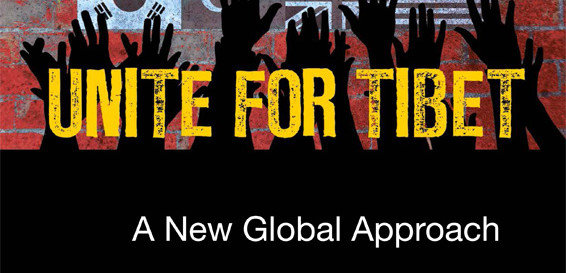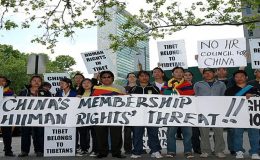Press Release – G8 Leaders Unite for Tibet
17 June 2013
Unite for Tibet: Activists urge G8 leaders to “lead the way” at Northern Ireland summit
New report exposes China’s hollow threats and calls for multilateral action on Tibet
Contacts:
US: Tenzin Jigme, International Tibet Network [English, Tibetan] +1 703 424 0015
Canada: Lhadon Tethong, Tibet Action Institute [English] +91 9882770392 or Kate Woznow, Students for a Free Tibet [English] + 1 917 601 0069
UK: Philippa Carrick, Tibet Society [English] + 44 7941 105485
Germany: Nadine Baumann, Tibet Initiative Deutschland [English, German] + 49 1779 315 616
Italy: Gunther Gologna, Associazione Italia Tibet [English, Italian] +39 339 100 5571
France: Tenzin Namgyal, Students for a Free Tibet [English, Tibetan, French] +33 6 33 69 90 99
Japan: Tsering Dorjee, Students for a Free Tibet [Tibetan, Japanese] +81 080 6952 6611
Russia: Natasha Inozemtseva, Save Tibet Foundation [English, Russian] +7 903 764 53 15
Australia: Kyinzom Dhongdue, Australia Tibet Council [English, Tibetan] +61 416 695 590
India: Tashi Dolma, Tibetan Women’s Association [English, Tibetan] + 91 9459 553 953
The new report, by International Tibet Network and its Member organisations [3], clearly illustrates the abject failure of the current policy to address China’s occupation of Tibet through bilateral approaches. It questions why Governments bow to China’s blatant bullying tactics whenever Governments and leaders decide to meet Tibet’s spiritual leader the Dalai Lama, and challenges the widely held view that angering China over Tibet will lead to onerous economic and diplomatic penalties, contending that most of China’s punitive reactions are more hot air than genuinely damaging in the long-term.
“For many years we have been urging Governments to unite for Tibet, and stand together against China’s bullying,” said Lhadon Tethong of the Tibet Action Institute. “With the crackdown in Tibet intensifying still further, the Tibetan people urgently need a show of diplomatic strength from G8 in the form of a multilateral initiative that will impress upon China the legitimate international concerns about Tibet.”
The report demonstrates that Governments that have angered China over Tibet have, nonetheless, seen their exports to China at the very least hold up if not increase in the aftermath [4]. Tibet campaigners argue that high level bilateral visits ultimately deliver only a small proportion of the trade deals trumpeted in the press, and express the view that proactive concessions to China rarely buy much in the way of long-term goodwill.
“China needs the world as much as the world needs China” added Tenzin Jigme of International Tibet Network. “Despite – or even because of – the global economic situation, G8 leaders need to show China that the bullying of its members and other nations, especially less influential ones, is unacceptable.”
Earlier this year there was a much publicised diplomatic spat that had China demanding an apology from David Cameron nearly a year after he displeased Beijing by meeting the Dalai Lama in London. To China’s annoyance and Tibet campaigners delight, Cameron held firm and the publicity prompted a spate of articles by journalists and academics that came out in support of a unified common position on issues such as Tibet [5].
“David Cameron has recently been on the receiving end of China’s intense and public bullying so he knows more than anyone the importance of defending core values and democratic principles,” said Philippa Carrick of Tibet Society. “As host of this G8 summit, we urge him to stand by his Government’s averred commitment to seeking a solution for Tibet and initiate a robust response that has the potential to bring about genuine progress on the 60-year occupation of Tibet, whilst safeguarding G8 members’ diplomatic relationships with China.”
Notes:
[1] Read ‘A New Global Approach: Unite for Tibet – G8 Lead the Way’ online at Issuu.com: http://issuu.com/internationaltibetnetwork/docs/new_global_approach_unite__for_tibe OR download from a PDF version via https://www.dropbox.com/s/88el3phdak50f4u/New_Global_Approach_Unite_%20for_Tibet.pdf [2] For details of all self-immolation cases in Tibet see http://standupfortibet.org/learn-more/ [3] The International Tibet Network is a global coalition of more than 180 Tibet Groups, https://www.tibetnetwork.org/. The report was co-authored by the Australia Tibet Council http://atc.org.au/US Tibet Committee, http://www.ustibetcommittee.org/, Students for a Free Tibet, https://www.studentsforafreetibet.org/ and Tibetan Women’s Association, http://tibetanwomen.org/
[4] For example, in 2012, UK exports to China rose 7.5% according to China Daily, despite the fact that David Cameron met the Dalai Lama in May of that year. Even Norway, not a G8 nation but incurring China’s wrath through its Nobel Peace prize award in 2010 to Chinese dissident and Tibet supporter Liu Xiaobo, saw a 14% rise in exports to China during 2011. [5] See for example ‘Does upsetting China matter?’, Kerry Brown, CNN, 14 May 2013 http://globalpublicsquare.blogs.cnn.com/2013/05/14/does-upsetting-china-matter/ and “The Tibetan Test”, Edward Lucas, European Voice, 16 May 2013 http://www.europeanvoice.com/article/imported/the-tibetan-test/77253.aspx




